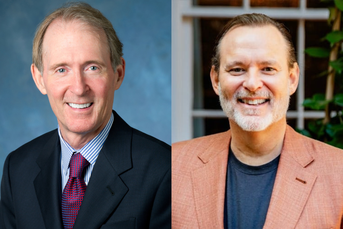Do higher-paid employees lead to higher stock prices?
 David van Adelsberg of Irrational Capital
David van Adelsberg of Irrational Capital
If an analyst can quantify the way employees are treated, it could help ascertain the value of a company’s stock.
If a company pays its employees more money, will that improve its stock price performance? Investing minds want to know!
“It’s a great question, and one of the things that really surprised us is that the level of compensation over a certain level, over a living wage, is not predictive of future equity performance,” said David van Adelsberg, founder of Irrational Capital. “Fairness, in terms of ‘I feel as though I am fairly compensated for the work I do’ – that lights up the board.”
Van Adelsberg is well positioned to opine on the subject since his firm manages a series of ETFs that invest in stocks based on corporate culture. The thesis behind it all, van Adelsberg said, is that if people are indeed a company’s most important asset, then if he can quantify the way they’re treated – or the so-called human capital factor – it should help him value the company’s stock price.
“We quantify the human capital factor for 2,600 companies, and if you look underneath the human capital factor, what you find is in social science, there are two types of motivational characteristics. One is intrinsic and one is extrinsic,” he said.
“Intrinsic are things that are deep and emotive and very personal things, like ‘I feel appreciated’ and a sense of pride and a level of trust. These are very hard things to actually measure, but the predictive nature of what we found is very significant,” van Adelsberg said.
The second set of characteristics are extrinsic, which are easier to count. These inputs include levels of compensation, quantum of training hours, benefits and the number of people in cohorts. Van Adelsberg fuses these two things together to create a numerical rating for all 2,600 companies on a yearly basis.
So far, his theory about people and their effect on corporate and ultimately stock performance has proved fairly prescient.
His Harbor Human Capital Factor US Large Cap ETF (HAPI) returned 30.3 percent in 2023, almost 8 percentage points better than the Morningstar large-cap blend category average and 5 percentage points above the S&P 500.
The top 5 holdings in the fund include the Technology Select Sector SPDR (6.1%) Amazon.com (5%), Microsoft (4.9%), Apple (4.9%) and NVIDIA (4.4%).
In fact, 30 percent of the fund is in technology shares, so that certainly helped the fund last year when the so-called “Magnificent 7” took off, making tech employees – many of them shareholders – very happy indeed.
Van Adelsberg also offers small-cap (HAPS) and unconstrained (HAPY) versions of the strategy. Both of these funds were rolled out in the spring of 2023 so the jury remains out on them so far. That said, if the results hold for smaller stocks as they do for larger companies, van Adelsberg may have effectively proven that happiness does factor into share price.
Or at the very least, fairness does.
Not all commercial real estate is vacant office buildings, says Whitestone REIT CEO
Learn more about reprints and licensing for this article.








